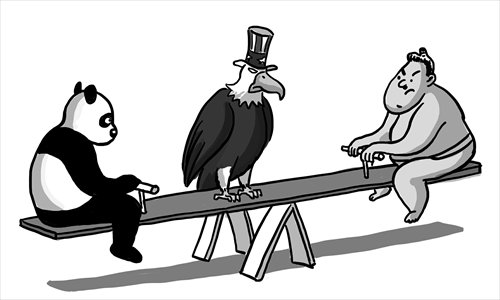HOME >> OP-ED
US clear on treaty obligations to Japan
Source:Global Times Published: 2013-9-28 20:03:01

Illustration: Liu Rui/GT
The US-Japan alliance has long been pivotal to the military balance in the Western Pacific. However, in recent years, as China emerges as an increasingly significant power and China and Japan engage in rivalry over history, territorial issues and maritime interests, the role of the US-Japan alliance in Sino-Japanese rivalry has been tested.
Americans generally believe an enhanced US-Japan alliance is helpful in maintaining stability in East Asia, especially in face of possible threats brought by China's rise despite China's professed peace-loving intentions.
But Americans are not certain as to what consequences China's rise will bring to US security, so they support enhancing the US-Japan alliance because they believe it can serve as a hedge should China become an enemy.
Accordingly, in the face of the current China-Japan rivalry, the US adopts a dual approach. It tries to enhance US-Japan alliance to dissuade China from taking provocative actions against Japan, but it also tells Japan not to abuse the alliance by taking provocative actions against China.
Due to tensions over history and territorial and maritime disputes in the East China Sea, an increasing number of Japanese people view China as an expansionist power. Under these circumstances, the Japanese government feels that it needs to build up Japan's military to counter the alleged China threat.
In late August, Japan's Ministry of Defense announced it has requested a budget of $49 billion for the next fiscal year, representing a 3 percent increase from the current year's budget.
The Japanese government is also reportedly reinforcing its defense capabilities and considering measures to enable its Self-Defense Forces to attack enemy bases.
Many Japanese believe that confronted with China's rise, the US may want Japan to play a larger role to contain China. The US interest in enhancing the US-Japan military alliance appears to have confirmed the belief.
Thus the Japanese government under Prime Minister Shinzo Abe expects US support for its efforts to increase defense budget and revise the constitution, so as to enable Japan's military to undertake actions that the existing constitutions prohibits. Some Japanese even entertain the idea that the US would side with Japan in a potential military confrontation with China over maritime interests in the East China Sea.
While it is not yet clear whether the US would endorse Abe's efforts to increase the defense budget and revise the constitution, it is quite certain that the US opposes any action that may provoke military conflict between China and Japan over the territorial and maritime interests in the East China Sea.
Japan may be disappointed and frustrated by this. However, since Japan is still highly dependent on the US for security, it does not have a viable alternative but to comply. In such circumstances, Japan is unlikely to initiate military conflict in the East China Sea.
The US has been taking its alliances very seriously. Concluding an alliance treaty customarily involves, on the US side alone, serious deliberation among bureaucracies within the government, protracted negotiation to specify responsibilities of the parties, and careful scrutiny and vigorous debates in Congress.
The end result is a treaty that unambiguously specifies the responsibilities of both parties and the US will act strictly according to the treaty.
By clearly specifying alliance obligations, the US makes sure that the alliance serves three purposes. It sends unambiguous messages to all parties when the US will act and thereby prevents unnecessary conflicts arising from misinterpretation.
Besides, it makes sure that the US will only act according to the previously negotiated terms and thereby offers maximum possible protection to US interests.
And finally, it limits the expectation of the alliance partner, so that it will not be too disappointed when the US does not meet all of its expectations.
In the case of the US-Japan alliance, the US promises to help defend Japan itself. However, it does so only if Japan is attacked by other countries. So if Japan initiates military conflicts with other countries without prior consent from the US, it cannot count on US support.
Japan may not be totally happy with such an arrangement. However, it does not have good reason to resent the US because US actions clearly specified in the alliance treaty between them, to which Japan previously agreed.
The article was compiled by Global Times reporter Wang Wenwen based on an interview with Jia Qingguo, professor and associate dean of the School of International Studies of Peking University. wangwenwen@globaltimes.com.cn
Posted in: Viewpoint